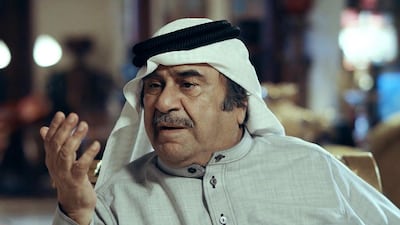A fresh debate over sectarianism has been sparked in Saudi Arabia and the wider Arab world after a prominent Saudi cleric responded to the recent death of Kuwaiti actor Abdulhussein Abdulredha by labelling him an "Iranian rejector".
The late Shiite actor, who died on Friday last week, was born in Kuwait to Kuwaiti parents, leaving no doubt in the minds of many that Dr Ali Al Rabieei's remark on Twitter had been a sectarian slur.
“Muslims are not allowed to pray for Abdulhussein Abdulredha because he’s an Iranian rejector who died misguided, and God forbade Muslims to pray for polytheists,” Dr Al Rabieei tweeted on Saturday, a day after Abdulredha's death.
The tweet sparked an outpouring of anger on social media across the Arabian Gulf, with users accusing Dr Al Rabieei of hate speech.
Social media users in Saudi Arabia were among those angered by the cleric's comments. Before his death, Abdulredha, the son of a well-known shipping captain and an artist, said he was “more beloved in Saudi Arabia than in Kuwait”.
---------------------------------------
Read more:
Comment: The death of Abdulhussein Abdulredha and Saudi Arabia's rebuke of toxic hate tweets
Abdulhussein Abdulredha, the Kuwaiti actor whose comedy shone a light on Arab society, dies aged 78
---------------------------------------
Within 24 hours, Hani Al Ghufaili, a high-ranking official in charge of electronic services at the ministry of communications in Saudi Arabia, announced that Dr Al Rabieei had been referred to the kingdom's copyright infractions committee for violating press and publications law.
Shortly after, the cleric deleted the tweet and issued an apology on his Twitter account.
The incident comes at a time when Gulf states are looking to curb sectarianism in the Arab world. Earlier this week, the UAE flew Iraqi Shiite cleric Moqtada Al Sadr to the country for talks with Sheikh Mohammed bin Zayed, Crown Prince of Abu Dhabi and Deputy Supreme Commander of the Armed Forces.
"Experience has taught us to always call for what brings Arabs and Muslims together, and to reject the advocates of division," Sheikh Mohammed said after the talks.
The following day, Mr Al Sadr met with Iraqi Sunni cleric Sheikh Ahmed Al Kubaisi at his UAE home to discuss improving Islamic and Arab unity.
Dr Al Rabieei's labelling of Abdulredha as an "Iranian rejector” is a term commonly used by radical Sunni clerics to describe anyone from the Shiite sect — even those who are in fact Arab.
But to call the late Kuwaiti actor an Iranian or to automatically assume that Shiites are not Arab is to deny more than 1400 years of Islamic history.
Throughout this time, Shiite communities have existed throughout the Arab world, and many continue to do so today. They include 10 per cent of Egyptians, who trace their religious ancestry back to the Fatimids who conquered Egypt in 969.
Meanwhile, Iran did not become a majority Shiite country until the Safavid Dynasty, some 700 years after the Islamic Empire extended to engulf what si now the modern-day Iranian state.
Iran wasn’t even the first country to have a majority Shiite population — that was achieved 1,400 years ago not by Persians, but by Arabs in Morocco who established the Idrisid dynasty in 788.
Indeed, the polarisation of the two Muslim sects in the Middle East today owes much to a modern politicisation of sectarianism which arguably began with the 1979 Iranian Revolution. With that, Iran became an Islamic Republic ruled by Ayatollah Ruhollah Khomeini, whose ambitions extended far beyond the country's borders.
Since then, alarmists will argue, the main objective of Iran’s foreign policy has been to lionise marginalised Shiite minorities in the Arab world and mobilise them into toppling Sunni-dominated governments — what has become known as “exporting the revolution”.
Iran's track record does little to convince its detractors otherwise. From assassination attempts on the late Kuwaiti ruler Sheikh Jabir Al Sabah to the funding of Houthi rebels in Yemen, the Iranian leadership is accused of many attempts to destabilise the region.
But although Arab political and religious leaders may have legitimate concerns about the overseas actions of Tehran, the backlash to Dr Al Rabieei's comments shows many in the region have deep concerns about accusations of all Shiites being Iranian sympathisers and believe such rhetoric only serves to further ostracise minority communities.

